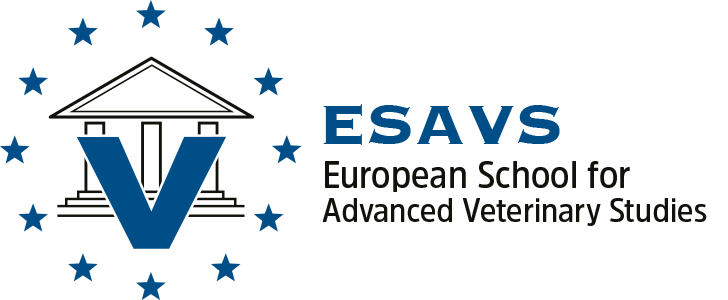European School for Advanced Veterinary Studies
Introduction
The MASVM testifies that a veterinarian has acquired a comprehensive intermediate level of competence in a specific discipline. It is not equivalent to a specialist diploma, nor a license for a certain type of professional activity but it certifies clinical competences in advanced small animal medicine and case management.
Program
The MASVM / Neurology program comprises:
Module I and II: Coursework with Examinations
Module III: Clinical Work and Case Log
Module IV: Thesis: Case Reports and Oral Examination
MODULES I and II: Clinical Work and Case Log (20 ECTS credits)
During enrolment in the Master Program, candidates will continuously and progressively apply the skills they have acquired in the Master program in their daily practice or university clinic, in this way supporting and reinforcing the learning process.
Candidates are required to accumulate 200 well-documented cases in the form of a case log. The case log shall be compiled mostly in the second half of the program. The candidate must be the primary responsible clinician for the diagnosis and work-up / the primary surgeon in the surgical disciplines, for all logged cases. Each case inserted in the case log must be supported by detailed documentation. The evaluator may randomly request the documentation for some cases which the candidate must then immediately deliver by email. Further instructions regarding the case spread are available for download at the bottom of this page and a template will be provided after enrolment. The case log shall be submitted in two batches (100 cases each). Each batch is evaluated and graded by the Examination Board. A passing grade has to be obtained.
MODULE IV: Case Reports and Oral Examination (20 ECTS credits)
The thesis consists of a series of 10 case reports covering a range of topics in the chosen discipline. Published case reports, (published during enrolment in the program) can also be submitted. One case out of the 10 case reports is randomly selected for the oral examination in an online format.
These case reports include a complete presentation of the case, illustrations where necessary, literature review including current publications on the subject with references and a discussion. The candidates must demonstrate a comprehensive understanding of the topic. Generally, a case report should contain 2000 words +/- 10%, excluding references and appendix. The combined case reports should not exceed a total of 20,000 words.
Participants are requested to submit their case reports by uploading them onto the respective MASVM platform on eCampus. Each case report is then reviewed by the respective PD (or an expert appointed by him/her) and graded on a 0-20 scale (<10=fail, 10-11.9=sufficient, 12-13.9=fair, 14-15.9=good, 16-17.9=very good, 18-20 excellent). The grades of the individual case reports are averaged to obtain one single grade. The average grade for the entire module must be 13 points or higher and none of the case reports must be graded below 10 points.
Published case reports, (published during enrolment in the program) can also be submitted. Published peer-reviewed case reports automatically receive at least a very good grade.
Please see case report instructions for detailed information.
Oral Examination
One case out of the 10 case reports is randomly selected for the oral examination, the office will contact the Program Director (PD) of the respective discipline and ask for agreement. The oral examination consists of a power point presentation of the case (12-15 min) and questions/discussion (15-25 min). The oral examination is a stand-alone examination and graded as pass or fail.
Please see oral examination instructions for detailed information.
Duration of the Program
The minimum duration of the MASVM program is three years, but generally the program extends over a period of up to five years. An additional year can be granted upon request and approval by the PGEC.
Course Curriculum
Master of Advanced Studies in Veterinary Medicine
